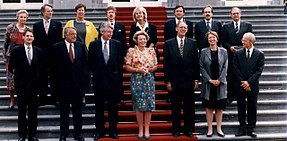First cabinet of Wim Kok
| First Kok cabinet | |
|---|---|
|
62nd cabinet of the Netherlands |
|
 |
|
| Date formed | 22 August 1994 |
| Date dissolved | 6 May 1998 (Replaced on 3 August 1998) |
| People and organisations | |
| Head of government | Wim Kok |
| Head of state | Beatrix of the Netherlands |
| Member parties |
Labour Party (PvdA) People's Party for Freedom and Democracy (VVD) Democrats 66 (D66) |
| Status in legislature | Majority government (Purple) |
| Opposition party | Christian Democratic Appeal |
| Opposition leader | Enneüs Heerma (1994-1997) |
| History | |
| Election(s) | 1994 election |
| Outgoing election | 1998 election |
| Predecessor | Lubbers III |
| Successor | Kok II |
The First cabinet of Wim Kok (1994-1998), also called the "Purple Coalition" because of its social-democrat (red) and liberal (blue) components, was a Dutch government formed by the political parties PVDA, VVD and D66. D66 had won its greatest political victory with the slogan that the Christian Democratic Appeal should be in the opposition for a change. The desire to form a cabinet without the Christian Democrats was based on the pivotal role in the political center that the CDA played in Dutch politics. The CDA had been in government continuously since its formation in 1980, and at least one of its three antecedents had been in government since 1918.
The main aim of the cabinet was to create employment. GDP growth had been erratic in recent years. The aim of the cabinet was to increase the influence of markets in the economy, with policies of tax reduction, economizing and trying to keep people out of the social care by supporting employment. Large infrastructural projects were started. Another aim was to make an end to the enormous debt of the Dutch government.
The Treaty of Amsterdam was signed during this cabinet. The Srebrenica massacre occurred under the responsibility of this Government, which led later to the fall of the second Kok cabinet.
The cabinet started processes of liberalisation which were completed by the same coalition in the following cabinet: the legalisation of prostitution in 2000, same-sex marriage in 2001 and Euthanasia in 2002.
This cabinet was the last to serve a full term until the Second Rutte cabinet of 2012-2017. Five of the following cabinets resigned and one was a temporary caretaker cabinet.
...
Wikipedia
